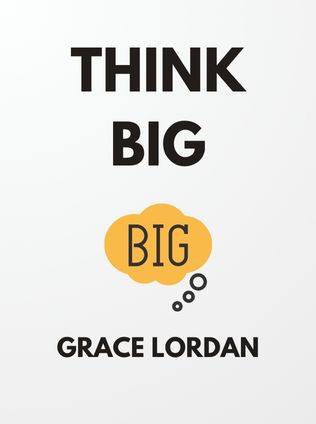
Think Big
Unleashing Your Potential for Excellence
By Grace Lordan
Published 01/1992
About the Author
Grace Lordan is a trailblazer in the realm of behavioral science, serving as an Associate Professor of Behavioral Science at the London School of Economics. Her expertise extends beyond academia as she also advises the UK government on matters of productivity and labor markets. Lordan’s professional journey is a testament to her deep understanding of human behavior and its impact on life outcomes. Her first book, "Think Big," published in 2021, distills years of research and experience into a comprehensive guide for individuals seeking to transform their lives. Through her work, Lordan has become a respected voice in the field, known for her practical advice on overcoming cognitive biases and achieving personal and professional growth.
Main Idea
At the heart of "Think Big" lies the principle that transformative change doesn’t happen overnight; it is the result of setting ambitious, long-term goals and taking consistent, small steps toward them. Grace Lordan argues that many people fail to achieve their dreams because they attempt to change too much, too quickly. By understanding and overcoming cognitive biases—systematic errors in thinking that affect our decision-making processes—we can align our actions with our true desires and gradually build the life we want. The book provides a step-by-step roadmap to identifying who you want to become and offers strategies to overcome both internal and external obstacles that might hinder your progress.
Table of Contents
- Understanding Cognitive Biases
- Plan for Who You Want to Be
- Overcoming Internal Obstacles
- Building Relationships that Propel You Forward
- Managing Time Effectively
- Recognizing and Addressing External Obstacles
- The Power of Reflection and Adaptation
Understanding Cognitive Biases
Lordan begins by delving into the concept of cognitive biases, which are mental shortcuts that can lead to systematic errors in judgment. These biases, deeply embedded in human nature, often prevent us from making rational decisions that serve our long-term interests. For example, the ambiguity effect causes us to prefer options with clear outcomes, even if those options do not align with our true passions. Similarly, the bandwagon effect influences us to conform to the behaviors and decisions of those around us, often leading us astray from our individual goals.
"Cognitive biases affect the decision-making processes of all humans, so these biases necessarily affect your life." — Grace Lordan
Understanding these biases is crucial because they influence nearly every decision we make. Awareness of our cognitive biases allows us to navigate around them, making choices that better align with our long-term goals and values. This understanding is the foundation upon which the rest of the strategies in "Think Big" are built, emphasizing the importance of a strong psychological base in the pursuit of personal transformation.
Lordan goes on to explore specific biases, such as the confirmation bias, where individuals tend to seek out information that confirms their pre-existing beliefs, often ignoring evidence that contradicts them. This bias can be particularly harmful when setting goals, as it may lead to overconfidence in certain areas while neglecting others that require attention. The author suggests that by becoming aware of these biases, we can create strategies to counteract them, such as actively seeking out opposing viewpoints or evidence that challenges our assumptions.
Another critical bias discussed is the status quo bias, which is the tendency to prefer things to remain the same, even when change could lead to better outcomes. This bias often keeps individuals stuck in unfulfilling careers or lifestyles because the fear of the unknown outweighs the potential benefits of change. Lordan emphasizes that overcoming this bias requires a conscious effort to embrace uncertainty and view change as an opportunity rather than a threat.
Plan for Who You Want to Be
Once we have a solid understanding of cognitive biases, the next step is to define our ideal future self—a concept Lordan refers to as "ME+". This is the person you aspire to become within the next two to ten years, characterized by the work they do, the skills they have acquired, and the impact they have on the world around them. Lordan stresses the importance of ensuring that this future self reflects your true desires, free from the influence of societal expectations or the pressures of conformity.
To create a plan for becoming this ideal self, Lordan advises identifying the key skills and attributes your future self possesses and breaking down the steps required to acquire them. This involves consistent, small efforts rather than overwhelming, drastic changes. For example, if your future self is a successful entrepreneur, you might start by learning the basics of business management and gradually taking on more significant challenges as your confidence and expertise grow.
Sign up for FREE and get access to 1,400+ books summaries.
You May Also Like
The Subtle Art of Not Giving a F*ck
A Counterintuitive Approach to Living a Good Life
By Mark MansonRich Dad Poor Dad
What the Rich Teach Their Kids About Money - That the Poor and Middle Class Do Not!
By Robert T. KiyosakiHow To Win Friends and Influence People
The All-Time Classic Manual Of People Skills
By Dale CarnegieFreakonomics
A Rogue Economist Explores the Hidden Side of Everything
By Steven D. Levitt and Stephen J. Dubner



















